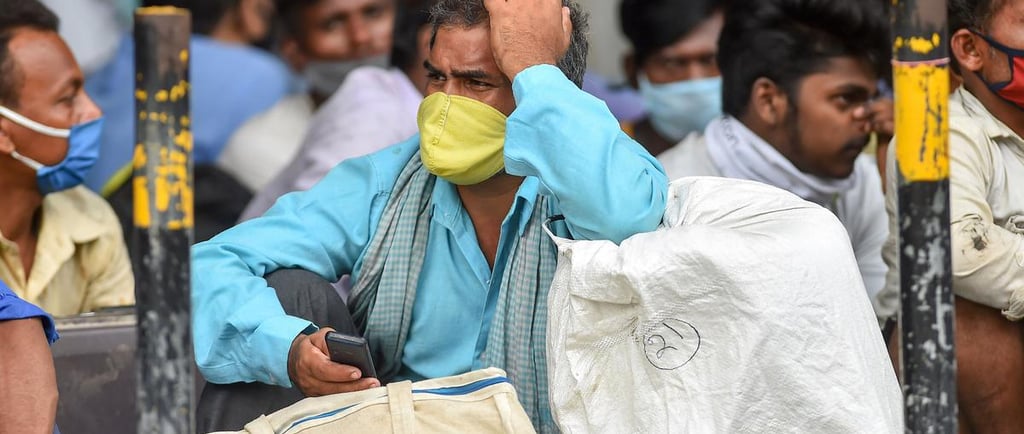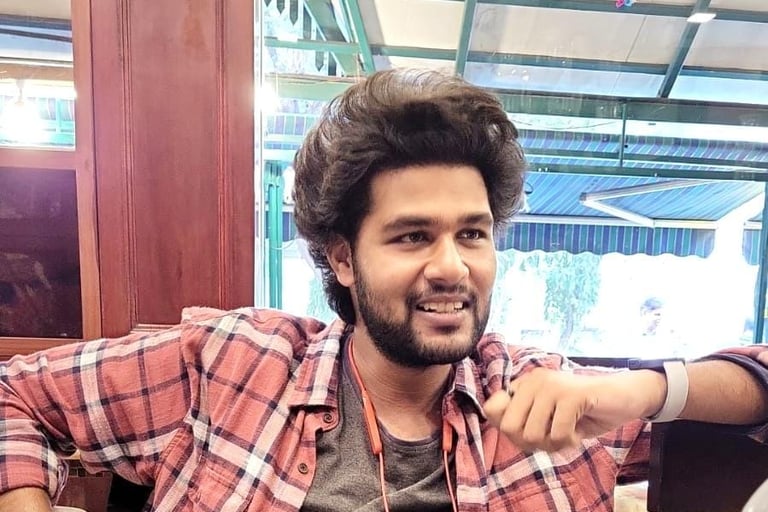No Eyes on Social Security in India
India's massive informal workforce, which is important to the country and its success, doesn't get the social security benefits they deserve. These workers do a lot but politicians focus on giving away things right before elections instead of real help. A law from 2008 aimed to change this but it did't do much. Numbers show a big difference in how well-off different groups are, with the most disadvantaged people being hurt the most. Even service sector workers do not have enough protections. As the way India works changes, a complete social security system that includes everyone is needed more than ever. India needs to stop with temporary solutions and improve the lives and safety of its hard-working citizens.


India's social security system, particularly for its unorganized sector, stands as a glaring example of policy neglect. Despite being a significant part of the workforce and contributing extensively to the national GDP, the unorganized sector has been systematically sidelined in social security considerations. Its 28 states and numerous national and local political parties make it difficult to provide comprehensive social security for everyone. The culture of these parties offering freebies has sidetracked the fundamental issue of enacting a robust Social Security Act. Governments across states like Tamil Nadu, Odisha, Delhi, and even the Central government have contributed to this trend. Their election manifestos often resemble documents promising social security schemes, but in reality, they primarily focus on distributing freebies to different voter segments. This shift has blurred the distinction between genuine social security measures and temporary handouts. As a result, people are increasingly viewing these freebies as substitutes for a proper and sustainable social security system, undermining the urgent need for long-term welfare policies that can uplift and protect all citizens.
The International Labour Organization (ILO) has long been a proponent of comprehensive social security systems as a fundamental right of workers worldwide. Although India is not a signatory to several fundamental ILO conventions, including the ILO Convention on Social Security (Minimum Standards), 1952 (No. 102), the country has drawn inspiration from the ILO's recommendations in shaping its social security policies. These recommendations emphasize universal coverage, adequate benefits, and the responsibility of the state to ensure the protection of workers' rights. However, the absence of formal partnership and ratification has resulted in India's labour issues receiving inadequate debate and deliberation. Consequently, the social security framework remains fragmented and insufficient, particularly for the vast unorganized sector. This has led to persistent challenges in providing comprehensive and effective social security coverage, making labour issues a perennial topic of concern and discussion in India.
The unorganized sector in India employs most of the labour force, contributing more than 50% to the GDP. Yet, these workers often lack essential social security benefits, job security, and safe working conditions. (Sengupta, 2007). The Unorganized Workers' Social Security Act 2008 was a step forward but remains grossly inadequate. It fails to provide comprehensive coverage and has been criticized for its limited scope and unclear implementation procedures.
Before the 2008 Act, the legal framework for the unorganized sector was fragmented and inadequate. Laws like the Workers Compensation Act (1923), the Employees' State Insurance Act (1948), and the Minimum Wages Act (1948) existed but did not comprehensively address the needs of the unorganized workers. The scope of the Workers Compensation Act was limited to injuries sustained at work; it did not address more significant social security concerns or the needs of many unorganized labourers. The Employees' State Insurance Act mostly helped employees in more prominent formal sector organizations; many small businesses and informal workers, particularly those in rural areas, were not covered by this law. The Minimum Wages Act was also poorly enforced, which resulted in noncompliance. It also established variable wage levels among states, frequently falling short of the necessities of life.
Furthermore, many workers were left without a guaranteed minimum wage because it did not cover all activities within the unorganized sector. These deficits call for a social security system that is more inclusive and comprehensive. The industry required a unified legal approach, which was lacking despite the recommendations from the Second National Commission on Labour and the National Commission for Enterprises in the Unorganized Sector (NCEUS).
Historically, bodies such as the Second National Commission on Labour and the National Commission for Enterprises in the Unorganized Sector (NCEUS) called for a single legal approach. Still, later laws did not wholly implement these suggestions. The legislative road from the initial plan in 2003 to the compromise version of the Unorganized Workers' Social Security Act of 2008 was marked by periodic amendments that reduced essential measures to ensure universal social security coverage. This compromise is reflected in the disparities highlighted by data from the 2022–23 Periodic Labour Force Survey (PLFS).
The primary objective of the Unorganized Workers' Social Security Act of 2008 was to extend social security benefits to unorganized workers. However, the Act's narrow focus on just three welfare schemes (old-age protection, health and maternity benefits, and life and disability) and the lack of a minimum universal entitlement highlight its fundamental flaws. It lacks clarity on implementation and accountability, further weakening its effectiveness.
Data extracted from the Periodic Labour Force Survey (PLFS) for the year 2022–23 tells us that the majority, 63.85%, of ST males and 68.24% of ST females are not eligible for Social Security Benefits. (Annual Report Periodic Labour Force Survey (PLFS) JULY 2022 - JUNE 2023 | Ministry of Statistics and Program Implementation | Government of India, n.d.). Only 36.15% of males and 31.76% of females have access to at least one Social Security benefit. An even higher percentage, 81.36%, of SC males and 83.97% of SC females are ineligible for benefits. Only 18.64% of SC males and 16.03% of SC females benefit from Social Security Benefits. On the other hand, approximately 73.93% of OBC males and 75.55% of OBC females are ineligible. Around 26.07% of OBC males and 24.45% of OBC females receive Social Security Benefits. In the general category, there is a relatively higher proportion, 39.97%, of males and 43.73% of females who get Social Security benefits. Surprisingly, 60.03% of males and 56.27% of females in the General category are also not eligible. This group is typically perceived to have better access to resources, socioeconomic positions, and opportunities compared to marginalized communities. Hence the expectation would be that they have higher eligibility and coverage for social security benefits.(Home, n.d.)
The significant paradox in India's social security system is indeed perplexing. Although the service sector is considered the best safety net, it remains a subject of ongoing discussion and debate. Industry veterans like Narayan Murthy, Shantanu Deshpande, and Ayushmaan Kapoor are highlighting the need for India to increase its labor productivity to compete with other countries that have advanced significantly. However, their comments have sparked both support and criticism. The service sector in India might seem fancy, but social security isn't always guaranteed. Big companies might offer retirement pensions and health insurance, but these benefits often miss many workers. The service sector is everywhere, with industries like tech and restaurants having different social security rules. Small companies can also find it hard to follow all the regulations. Is it complacency, indifference, or a deliberate oversight?
A new law called the Code on Social Security was created in 2020 to try and make things simpler for service sector workers. Its target was to provide coverage to all workers, including those in the unorganized, gig, and platform sectors; the Code on Social Security, 2020, seeks to streamline and combine many social security regulations into a single code. By requiring a single registration for establishments, it facilitates compliance, creates social security funds, and guarantees benefit portability. Improving transparency and timely delivery of benefits is the goal of using digital platforms and enhanced enforcement measures. To guarantee that payments are received by the intended recipients and to build a more inclusive and adequate social security system, the Code also calls for establishing welfare boards to supervise the execution of social security programs. The process from the first draft of the Unorganized Sectors Worker Bill in 2003 to the passing of the Unorganized Workers Social Security Act in 2008 involved many revisions. However, as we can see, with each revision, important provisions meant to ensure complete social security coverage were gradually weakened. The final Act, though a significant step forward, ended up being a compromised version. This law only works if it is enforced, ensuring all companies follow the rules. There's also a worrying trend of companies trying to get out of social security payments by pretending their regular workers are freelancers. This problem isn't unique to service jobs; factories also have issues with temporary workers not getting social security benefits.
The truth is India's social security system isn't keeping up with the changing world of work. India’s social security system for the unorganized sector is a patchwork of inadequacies and missed opportunities. These days, more and more people have temporary or freelance jobs, and the system was designed for a time with more stable jobs. India needs a social security plan that covers everyone, no matter what kind of work they do. This includes the giant informal sector, where many people work for themselves, and the growing number of temporary workers across all industries. Farmers, who typically work alone and for themselves, are another group that needs to be considered.
How long will we dance to the tune of fake narratives and political agendas? When will we prioritize substantive discussions over short-term freebies? These questions persist. India needs new and creative ideas to make sure all its citizens have social security so they can feel secure and valued no matter what kind of job they have. By fixing the current system and making it more inclusive, India can create a social safety net that protects everyone.
References:
1. Home. (n.d.). https://microdata.gov.in/nada43/index.php/home
2. International Labour Standards on Social Security. (n.d.). https://www.ilo.org/global/standards/subjects-covered-by-international-labour-
3. Jacob, C. (2023, November 7). India debate on 70-hour workweek: Illegal or road to greatness?CNBC. https://www.cnbc.com/2023/11/07/india-debate-on-70-hour-workweek-illegal-or-road-to-greatness.html
4. New measures to protect interests of unorganized labour. (n.d.). https://pib.gov.in/PressReleasePage.aspx?PRID=1986238#:~:text=The%20details%20of%20%20the%20social,PMJJBY%20scheme%20is%20for%20Rs.
5. Sebastian, B. M. (2023, November 1). NR Narayana Murthy: Why Indians are debating a 70-hour work week. https://www.bbc.com/news/world-asia-india-67269976
6. Sengupta, A. (2007). Report of the National Commission for Enterprises in the Unorganized Sector. In National Commission for Enterprises in the Unorganized Sector. https://dcmsme.gov.in/condition_of_workers_sep_2007.pdf
7. Unorganized Workers Social Security Act, 2008. (2008, December 30). https://www.indiacode.nic.in/handle/123456789/2100?sam_handle=123456789/1362
ABOUT THE AUTHOR


Swapnil is a multi-tasking policy enthusiast. He holds a B.A. (Hons.) in Political Science from Jamia Millia Islamia, New Delhi, and is currently enrolled in two Master's degrees - one in Public Policy and Governance from TISS, Hyderabad, and another in Political Science from IGNOU, New Delhi.
His skill set combines policy analysis, advocacy, and evaluation with data analysis expertise using tools like Stata and Quantum GIS. He is also also proficient in communication, writing, and teamwork.
Reach out to him at - https://www.linkedin.com/in/swapnilsingh2502
